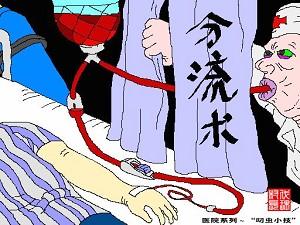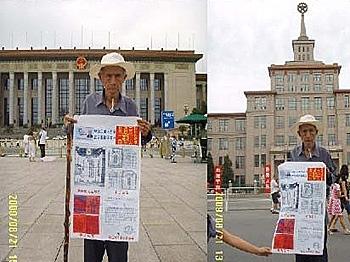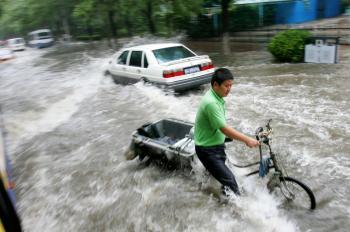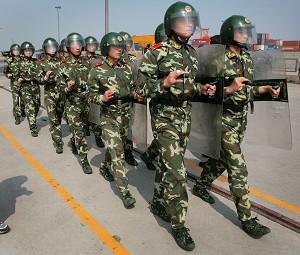Chinese web cartoonist Pan Qi, who produces under the name Dailicunzhang, became a sensation overnight. Within one year, Pan Qi published five collections of his work—some 700 cartoons. Many of his cartoons were featured on the popular Cat898.com forum and attracted many fans. The Internet monitoring team of the Siping City Public Security Bureau soon noticed Pan’s popularity and works. Last December, the Bureau visited Mr. Pan’s home and spoke with him, claiming that his cartoons are too extreme and have misled Internet users. After the Bureau’s visit, Pan Qi’s works have disappeared from online forums. While following up on this story, The Epoch Times uncovered a shocking personal story about Pan Qi. After a car accident fourteen years ago, Mr. Pan was rushed to the General Hospital of the People’s Armed Police in Jilin Province for rescue. In addition to delayed rescue and complications after the surgery, six years later, Pan Qi discovered he was missing a kidney.
Delays in Emergency Treatment and Complications After Surgery
On October 25, 1992, Pan Qi was involved in a car accident on Yitong road in Jilin Province. He was sent to the General Hospital of the People’s Armed Police in Jilin in Kuancheng District of Changchun City for emergency treatment. Pan’s surgery was delayed for over ten hours, waiting for a doctor from the third section of the general surgery department, which is responsible for organ transplant surgery. It was not until the next morning this doctor and another one from the first section of the general surgery department operated on Pan Qi together for over three hours. Pan’s relatives said that later, a nurse holding a plastic bag told Pan’s family that his spleen burst and was removed. The plastic bag she held was filled with blood dregs about the size of half a cigarette case. When Pan’s relative asked to see it, the nurse refused.
After regaining consciousness, the doctor told Pan Qi that he had serious injuries to his chest and abdominal regions. The surgery removed his burst spleen and fixed his injury in the left renal capsule membrane.
Twenty days after the surgery, Pan discovered a serious abscess under his left arm and he started to suffer extreme pain in his left chest. His body temperature shot up, and he ran a high fever. the two doctors performed another joint-surgery to drain the abscess—without first receiving consent from his family. In addition, this surgery was carried out after work hours, when other staff members were absent.
Realization of Missing Kidney Six Years Later
In August 1998, six years after the surgery, Pan Qi went to the China-Japan Union Hospital in Changchun City for a physical checkup. During his B-type ultrasonic inspection, the doctor asked Pan if his left kidney was surgically removed, because it could not be found. After multiple checks without any success, the doctor took an X-ray that proved Pan’s left kidney was missing.
Pan immediately had a 15-day hospitalized inspection at the First Clinical Medical Institute of Bethune University. The CT and enhanced CT test results all indicated that his left kidney was gone.
In Search of Answers for Missing Kidney
Pan Qi hired a lawyer to go to the People’s Armed Police in Jilin to check his medical records. The hospital claimed that his medical records could not be found. The person in charge of the hospital’s medical section said that the B-type ultrasonic inspection record in the hospital verified that Pan’s kidney was still intact after his surgery. On November 16, 1998, the hospital issued a document confirming Pan Qi had no missing kidney. The document stated, “After holding a meeting for assessment, our hospital concludes that there was no missing left kidney according to the re-examination result after the surgery.”
Recalling the course of treatment at the armed police hospital, Pan became suspicious. His surgery could have been successfully performed by the first section doctor alone—why was it necessary to wait for the organ transplant doctor? Why was the second surgery performed after work hours and without his family’s consent or pre-surgery preparations? Pan Qi felt confident that his kidney was missing after the first surgery.
The whereabouts of Pan Qi’s kidney is still a mystery. Could it be possible that doctors in China are daring and unethical enough to harvest organs from their living patients without consent?




